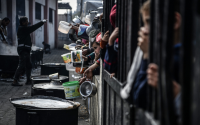2 Temmuz 2007David Usborne
There may be no one who has worked harder to raise awareness worldwide of the threat of climate change than Al Gore, the former US vice-president, and this Saturday he takes it to the next level with Live Earth, a series of concerts around the globe that will be watched or heard by as many as two billion people.
But many millions of us hardly need Mr Gore to tell us something is up with the weather. Not if you have been driven from your home in recent days by cyclones in Pakistan, by raging floods in Texas or Yorkshire, by forest fires in California or have suffered in intense heat in southern Europe.
Linking a single meteorological event, however dramatic, to global warming may be tricky. (Yes, there have been protracted rain delays at Wimbledon before this year.) The planet has forever undergone cycles of droughts, floods and fires. Yet, few scientists now say those cycles are not becoming more extreme and frequent or that global warming is not a major factor.
Each new scientific paper that is released seems to carry a message grimmer than the last. This year, a UN panel on climate change, with 2,500 leading experts, officially endorsed the notion that the rising temperatures are the result of human activity, notably the burning of fossil fuels.
The warmest 10 years of the past 150 years have all been since 1990. And without action by us to curb it, that temperature climb is not going to stop. The "best estimate" of the UN panel is that the planet's surface temperatures will spike a further 1.8 to 4 Celsius (3.2 and 7.8 Fahrenheit) by the end of this century.
The world over, people are getting the message that the planet is ailing. Results last week from an unprecedented poll in 46 countries by the US-based Pew Research Centre showed environmental degradation is the number one concern of people around the world, eclipsing worry even about nuclear attacks, ethnic rivalries or Aids.
"It's going to get worse before it gets better," says David Masur, director of PennEnvironment, an environmental advocacy group in Pennsylvania. "We're not even at the tipping point yet, in terms of the worst of the worst."
Salvano Briceno, who shapes UN policy for responding to natural disasters, agrees. "Severe events are going to be more frequent." He is urging governments to get cracking on plans to protect populations from the threat posed by more dangerous events such as drought, famine and flooding. "We need to reduce all the underlying risk factors, such as by locating communities out of hazard-prone areas," he says. "We now have a clearer picture of what is going to happen and it's urgent that governments give this higher priority."
In the broadest terms, the impact of rising temperatures is the faster evaporation of surface moisture. This in turn threatens more frequent and more grave droughts for some. At the same time, this increases the amount of moisture entering the atmosphere, meaning it has eventually to fall as rain, sometimes in extreme storm events such as last week's flooding in Britain and cyclones in Asia.
Even the devastating forest fires in Tahoe, California, last week seem to be connected to the warming phenomenon. There were four times as many major wildfires in the western US between 1986 and 2004 as there were from 1970 to 1986. As spring and summer temperatures have risen, so the mountain snowpacks have retreated, flow in streams and rivers has decreased and so humidity in forest areas has fallen. This year, the snowpack above Tahoe was just 15 per cent of the average.
On Friday, Stavros Dimas, the EU commissioner for the environment, unveiled new EU proposals for protecting Europeans from weather disasters. He added: "In Britain, there is bad flooding and destruction on a scale rarely seen before, and more bad weather is on the way. For some people in Europe it will be a case of adapt or die."
Europe
To fly from the UK to Italy last week was like crossing continents: Britain's cold rain gave way to suffocating heat and a ferocious scirocco, the hot Saharan wind, in Sicily. The Fiat car plant was closed after employees refused to work in the heat. Fires were burning in southern Italy, with Calabria (24 blazes) and Puglia (22) worst affected. In Greece, seven people have died. Firefighters and soldiers are battling a fire which has destroyed much of Mt Arnitha National Park, and threatens Athens. Peter Popham
Australia
From the worst drought in a century to the worst floods in decades, Australians are wondering what will come next. Severe storms have battered the east coast, causing major flooding in New South Wales. In the low-lying Gippsland region of Victoria, hundreds of people had to abandon homes and businesses at the weekend after rivers burst their banks. Helicopters rescued residents as floods engulfed houses, barns and paddocks, leaving cattle stranded. Floods have also hit the Newcastle area, north of Sydney, leaving nine people dead. Another attempt is being made to refloat the Pasha Bulker, a coal freighter swept on to a sandbank just off a Newcastle beach three weeks ago.Kathy Marks
Americas
The first days of summer in the United States have seen fire and water combine with devastating effect. Wildfires around Lake Tahoe, California, have consumed more than 250 homes. Fire chiefs predict that the week-old fire should finally be brought under control by tomorrow. Boston broke high temperature records on Wednesday while black-outs in a sweltering New York City stranded a quarter of a million commuters. Meanwhile Texas and Oklahoma, until recently struggling with drought, have been hit with record rains and widespread flooding. Storms in the southern plains left 11 people dead.David Usborne
Asia
Fresh floods struck Pakistan this weekend, killing at least 100 people and forcing another 10,000 from their homes, just days after Cyclone Yemyin left 1.5 million people without shelter. The latest floods roared through six villages in the country's Baluchistan province. Troops and emergency crews are struggling to help the homeless and those stranded by the flood-waters. The province had already been reeling from floods caused by the cyclone and persistent rain only aggravated the situation. Andrew Buncombe
Africa
Freak weather conditions turned Joburg into "Snowburg" last week, the city's first snowfall since 1981. A massive cold front has swept across South Africa, plunging temperatures well below zero, closing roads and cutting electricity. In the Eastern Cape, motorists were dug out of metre-high snowdrifts. Further north, the Horn of Africa is battling its persistent drought. UN statistics show rainfall in Sudan down 40 per cent in the past 20 years. Rachel Shields






